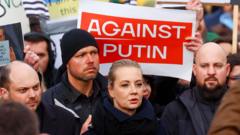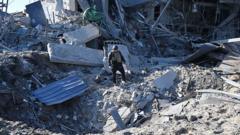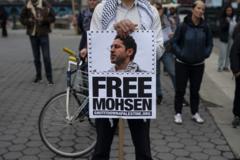In a powerful demonstration of dissent, Russia's exiled opposition marched in Berlin, shedding light on the ongoing political and humanitarian crisis impacting their homeland and Ukraine.
Russia's Opposition Activists Protest in Berlin Against Putin and the War in Ukraine

Russia's Opposition Activists Protest in Berlin Against Putin and the War in Ukraine
Thousands march in Berlin as exiled Russian opposition leaders demand an end to aggression and political repression.
On a day marked by solidarity and protest, several thousand exiled Russians marched through central Berlin, leading calls against President Vladimir Putin and the ongoing war in Ukraine. Yulia Navalnaya, widow of the jailed opposition leader Alexei Navalny, became a prominent figure of the march, underscoring the legacy of her late husband, who died in February while imprisoned in Russia—an assertion by advocates claimed to have Kremlin entanglements, a charge Moscow has denied.
The demonstrators proudly waved the blue and white Russian opposition flag in conjunction with Ukrainian flags, chanting slogans such as "no to war" and "Putin is a killer" in Russian as they made their way towards the Russian embassy. Central to their pleas were three key demands: the immediate withdrawal of Russian troops from Ukraine, holding Putin accountable as a "war criminal," and the release of all political prisoners within Russia's borders.
Critics have pointed out that the Russian opposition has historically grappled with perceptions of neglect towards the suffering endured by Ukrainians. Addressing this concern, Oleg Orlov, a notable anti-war activist and co-chair of the Nobel Peace Prize-winning organization Memorial, spoke out during the rally, boldly demanding more military support for Ukraine. In a statement to the BBC, he emphasized the necessity of steadfast assistance to Ukraine, arguing that a victory for Putin would pose a long-term threat to democratic aspirations in Russia itself.
Orlov, currently living in Germany after a precarious release in a prisoner swap, said he believes that peace at any cost is a misplaced notion that ignores the wider implications for Europe. Meanwhile, Vladimir Kara-Murza, another prominent opposition figure recently freed after over two years of imprisonment, took a strong stance against the Russian embassy in Berlin, describing it as “a spy nest of Russia.”
Among the demonstrators was Anastasia, a young IT professional who had fled Russia in March 2022 due to her disapproval of the war. Expressing the urgency of such rallies, she noted that dissent in an authoritarian regime is perilous, and speaking out in Germany offers a vital lifeline for expressing opposition.
This rally not only served as an outlet for Russian expatriates to voice their dissent, but also illuminated the complex interplay of political struggles affecting both Russia and Ukraine amidst a backdrop of war and geopolitical tension.





















